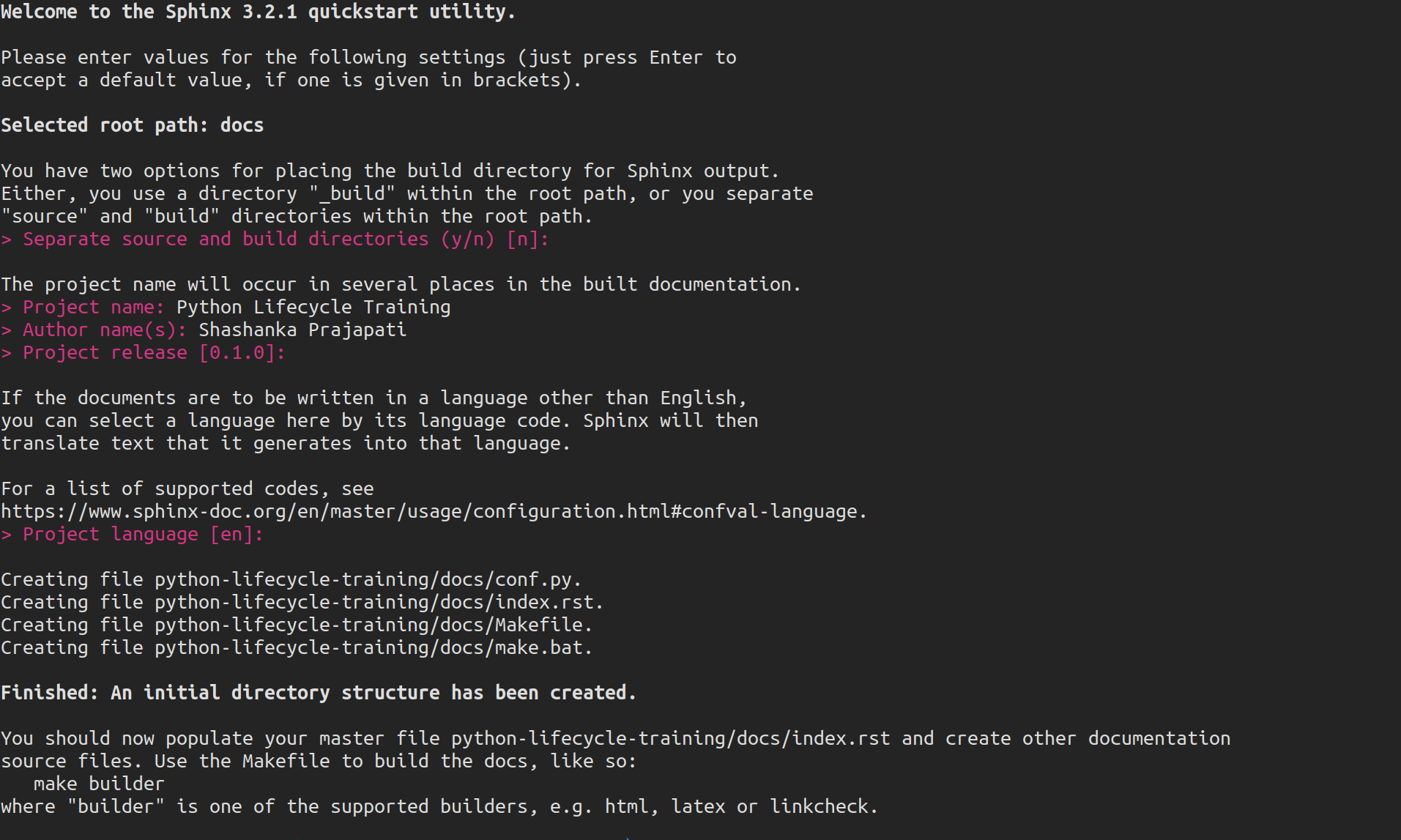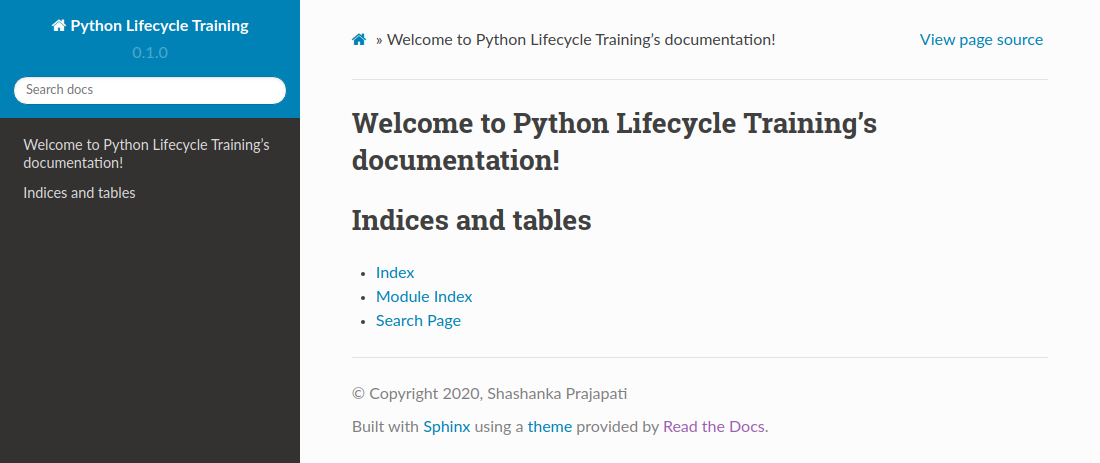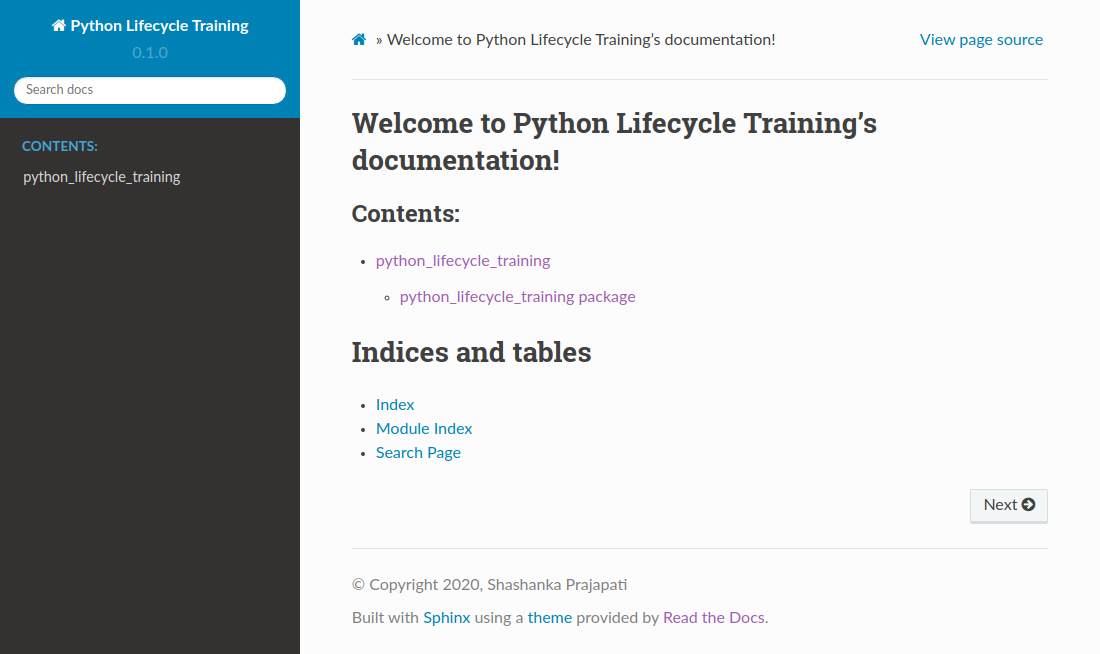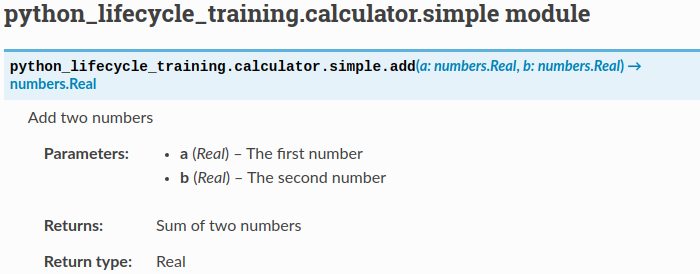Documentation: Sphinx¶
Sphinx is a tool that makes it easy to create intelligent and beautiful documentation, written by Georg Brandl and licensed under the BSD license.
It was originally created for the Python documentation, and it has excellent facilities for the documentation of software projects in a range of languages. The following features should be highlighted:
Output formats: HTML (including Windows HTML Help), LaTeX (for printable PDF versions), ePub, Texinfo, manual pages, plain text
Extensive cross-references: semantic markup and automatic links for functions, classes, citations, glossary terms and similar pieces of information
Hierarchical structure: easy definition of a document tree, with automatic links to siblings, parents and children
Automatic indices: general index as well as a language-specific module indices
Code handling: automatic highlighting using the Pygments highlighter
Extensions: automatic testing of code snippets, inclusion of docstrings from Python modules (API docs), and more
Contributed extensions: more than 50 extensions contributed by users in a second repository; most of them installable from PyPI
Sphinx uses reStructuredText as its markup language, and many of its strengths come from the power and straightforwardness of reStructuredText and its parsing and translating suite, the Docutils.
For more information visit https://www.sphinx-doc.org/en/master/
Installation¶
$ poetry add sphinx --dev
Setup¶
Sphinx comes with a script called sphinx-quickstart that sets up a source directory
and creates a default conf.py with the most useful configuration values from a few
questions it asks you.
$ sphinx-quickstart -v `poetry version -s` docs

After you answer all the prompts the following files will be created:
docs
├── _build/
├── _static/
├── _templates/
├── conf.py
├── index.rst
├── make.bat
└── Makefile
Theme¶
Doesn’t look much right now but it’ll get better. Let’s change the theme to the most popular theme, Read the Docs.
$ poetry add sphinx-rtd-theme --dev
$ poetry remove sphinx --dev
Change the following line in conf.py
# -- Options for HTML output -------------------------------------------------
# The theme to use for HTML and HTML Help pages. See the documentation for
# a list of builtin themes.
html_theme = "sphinx_rtd_theme"
Clean the existing build and then build again.
$ make -C docs clean
$ make -C docs html
$ chromium docs/_build/html/index.html

Does it look better now?
Auto Documentation¶
We can convert our code docs into readable sphinx documentation.
First, uncomment the following lines in conf.py:
# -- Path setup --------------------------------------------------------------
# If extensions (or modules to document with autodoc) are in another directory,
# add these directories to sys.path here. If the directory is relative to the
# documentation root, use os.path.abspath to make it absolute, like shown here.
import os
import sys
sys.path.insert(0, os.path.abspath('.'))
Now add the autodoc extension in the conf.py file itself.
# -- General configuration ---------------------------------------------------
# Add any Sphinx extension module names here, as strings. They can be
# extensions coming with Sphinx (named 'sphinx.ext.*') or your custom
# ones.
extensions = [
"sphinx.ext.autodoc",
]
Generate the docs for your modules
$ sphinx-apidoc -o docs/ python_lifecycle_training
Add modules as a content in index.rst file
.. toctree::
:maxdepth: 2
:caption: Contents:
modules
Add your module docs in a .gitignore file within the docs.
# Ignore module docs
python_lifecycle_training*.rst
Clean and build again
$ make -C docs clean
$ make -C docs html
$ chromium docs/_build/html/index.html

Google Docstrings¶
Let’s try adding a docstring in our simple calculator to see what happens
def add(a: Real, b: Real) -> Real:
"""Add two numbers
Args:
a (Real): The first number
b (Real): The second number
Returns:
Real: Sum of two numbers
"""
logger.info(f"Adding {a} to {b}")
return a + b
$ make -C docs clean
$ make -C docs html
$ chromium docs/_build/html/index.html

Something doesn’t seem right here. In order for google style docstrings to be displayed
properly we need the napoleon sphinx extension. Go ahead and add it to conf.py
# -- General configuration ---------------------------------------------------
# Add any Sphinx extension module names here, as strings. They can be
# extensions coming with Sphinx (named 'sphinx.ext.*') or your custom
# ones.
extensions = [
"sphinx.ext.autodoc",
"sphinx.ext.napoleon",
]
$ make -C docs clean
$ make -C docs html
$ chromium docs/_build/html/index.html

This seems better, doesn’t it?
Document Build Test¶
Add the following lines in your tox file
[tox]
envlist = ..., docs
...
[testenv:docs]
basepython = python
changedir = docs
deps =
sphinx-rtd-theme
toml
commands =
sphinx-build -b html -d {envtmpdir}/doctrees . {envtmpdir}
Run tox
$ tox
Miscellaneous¶
Useful sphinx extensions¶
# -- General configuration ---------------------------------------------------
# Add any Sphinx extension module names here, as strings. They can be
# extensions coming with Sphinx (named 'sphinx.ext.*') or your custom
# ones.
extensions = [
"sphinx.ext.autodoc",
"sphinx.ext.coverage",
"sphinx.ext.doctest",
"sphinx.ext.githubpages",
"sphinx.ext.napoleon",
"sphinx.ext.todo",
"sphinx.ext.viewcode",
]
Don’t show todos¶
# -- Options for todo extension ----------------------------------------------
# If true, `todo` and `todoList` produce output, else they produce nothing.
todo_include_todos = False
Better syntax highlighting¶
# The name of the Pygments (syntax highlighting) style to use.
pygments_style = "sphinx"
Auto-generate your project meta¶
$ poetry add toml --dev
import toml
sys.path.insert(0, os.path.abspath('.'))
# -- Project information -----------------------------------------------------
def _get_project_meta():
return toml.load("../pyproject.toml")["tool"]["poetry"]
pkg_meta = _get_project_meta()
project = str(pkg_meta["name"])
copyright = "2020, Shashanka Prajapati"
authors = str(pkg_meta["authors"])
# The short X.Y version
version = str(pkg_meta["version"])
# The full version, including alpha/beta/rc tags
release = version
Next Step¶
To move on to the next step commit or stash your changes then checkout to the branch
deploy/ci/test
$ git stash
$ git checkout deploy/ci/test
Uninstall¶
$ poetry remove sphinx-rtd-theme --dev
